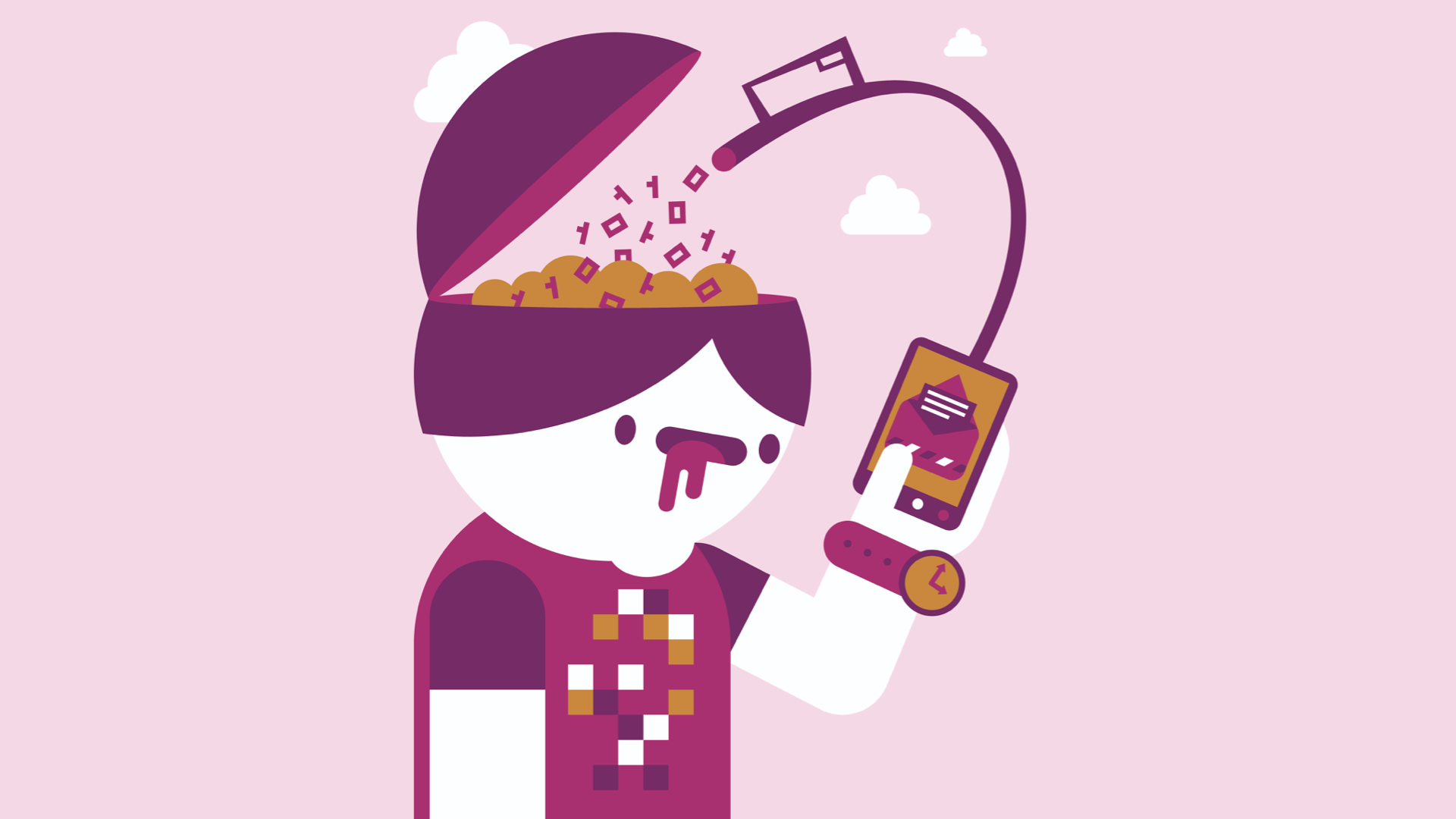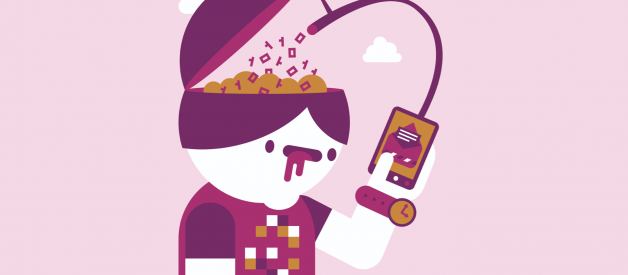The rise of a community dedicated to combatting the endless scroll
 Credit: TeamOktopus/iStock/Getty Images Plus
Credit: TeamOktopus/iStock/Getty Images Plus
In December 2017, Bryce Gordon was a 20-year-old college student in Bellingham, Washington, when he realized he needed to radically change how he lived his life. He was spending way too much time online.
Most days, he?d return from classes to his apartment, crack open his laptop, and spend the rest of his evening on the internet, browsing Twitter, 4chan, Facebook, and Wikipedia. Sometimes he woke up in the morning still wearing his clothes from the day before, his laptop screen the only source of light in his bedroom. He stopped folding laundry or cooking himself meals. He?d been living like this for years.
?I was doing very poorly in school, neglecting tons of responsibilities and necessities in life,? Gordon says. ?I had all these ideas of a life I wanted to lead, but I wasn?t doing it. I started to think more about how that might have to do with my use of the internet.?
That month, he conducted a Google search for ?internet addiction, reddit.? The first result that came up: a subreddit community called NoSurf.
A growing awareness of the harmful influence that the internet, and especially social media, has on our lives is fueling a movement to reexamine how we interact with technology. A brave new world of constant connectivity is now our collective soma, complete with troubling psychosomatic conditions: loss of sleep, numbing of creativity, an inability to look others in the eye. In a widely read article in the Atlantic ? titled ?Has the Smartphone Destroyed a Generation?? ? sociologist Jean Twenge noted a correlation between depression and internet use, especially among younger users. People born between 1995 and 2012, she wrote, have been shaped by smartphones and social media, whose twin rise ?has caused an earthquake of a magnitude we?ve not seen in a very long time, if ever.?
Perhaps no one has been more out front on the topic than Tristan Harris, a disaffected ex-Google product manager who founded the nonprofit Time Well Spent (since renamed the Center for Humane Technology). The titans of the tech industry, Harris said in 2017, are ?taking away our agency? to live the lives that we want.?
But years before the steady drumbeat of techno-anxiety, there was NoSurf.
Launched as a subreddit in 2011, NoSurf quickly became home to a growing group of strangers with one thing in common: They all thought the internet was having an adverse, uncontrollable effect on their lives and were looking for mutual commiseration ? and help. The irony in turning to a social media site to explore the roots of his problem wasn?t lost on Gordon, but reading posts from the NoSurf community left him feeling reassured that his internet use wasn?t just a personal failing.
?Many people reported the same symptoms I had: difficulties with memory, extreme difficulty concentrating, and feeling unable to stop scrolling through these infinite feeds,? he says.
Thanks to the growing skepticism of technology, NoSurf membership exploded in 2018, from 10,000 people ?rewiring? ? a popular phrase among NoSurfers ? to more than 26,000. It has even sprung a companion website, NoSurf.org, and a manifesto that calls for freedom from absentminded distraction and a connection with real people rather than ?pixels on a screen.?
?We just try to steer people away from mindless browsing, where you?re just scrolling through without any real intention,? says Nikhin Kochath, a subreddit moderator and creator of NoSurf.org.
Spreading that message far and wide is the next step for Kochath and his band of conscientious objectors in order to convince more people that avoiding the passive parts of the internet should be a mainstream proposition, not a fringe subculture. The next step, Kochath says, is to take NoSurf offline: create chapters of members across the United States that would connect people face-to-face in real-life meetups. Just one problem: To do that, Kochath expects he?ll need about 100,000 members to join NoSurf, an online community connected by the very force it?s fighting.
NoSurf started with a single Reddit post published on August 30, 2011: ?Why an internet addiction is insidious.? The author, barbarianvillage, gave two concise reasons for their premise. The first is time?namely, how much of it is wasted by aimlessly surfing the internet rather than performing specific tasks. But it?s the second reason that so many in NoSurf cite as the reason they signed up: The internet changes the brain. ?It changes your tolerance for obstacles, your patience, your ability to stick with goals,? barbarianvillage wrote. ?From my own experience, I can say my ability to focus has really gone down since my internet surfing has increased.?
The first commenter on barbarianvillage?s original post succinctly described the group?s evolution: ?Hopefully we can get some readers to motivate each other not to surf too much!?
There?s a certain pattern to the stories NoSurfers tell about how they arrived at the community. Nikhin Kochath discovered NoSurf when he found he could no longer make it through an entire book. The 25-year-old New Yorker emigrated from India when he was six, and one of his earliest memories in the United States is heading to the library and reading every book he could. He?s a child of the Harry Potter generation and fondly remembers waiting in line for the latest J.K. Rowling books.
?I would read the entire thing in one sitting,? Kochath says. ?As I got older, at some period, this stopped.? At a certain point, he says, ?nothing could captivate my interest.?
?Someone posted that the [No Surf] subreddit is like having an AA meeting inside a bar.?
Nothing, that is, except the internet, where he spent hours browsing Facebook, Twitter, and Snapchat. After his college grades dropped from As to Cs and he barely completed his final semester to graduate, Kochath recognized that his internet usage was becoming a serious problem. He installed an app called RescueTime on his computer to track his activity. The results startled him: Kochath spent as much as seven hours per day on sites like YouTube and Reddit. ?That was terrifying for me,? he says.
Ava Lang, a 23-year-old student from Germany and another NoSurf moderator, would usually begin her days with Tumblr and scroll through various sites before ending up at Facebook. ?I didn?t really have time for the things that mattered, but I didn?t know where the time was going,? she says. Her turning point? One weekend, Lang sat in bed checking all her feeds and looked up to find four hours had vanished.
While trawling other subreddits about stoicism and anti-consumption, Lang found links to NoSurf. The group?s goal resonated with her: ?NoSurf isn?t about quitting the internet, it?s about using it in a purpose driven manner,? wrote Kochath in a post. Inside NoSurf, Lang discovered the tools and strategies to reduce time spent mindlessly clicking around. One app she found, called TimeGuard, was made by a NoSurf user. It allows Lang to block websites she selects according to a schedule; if she needs access to one of the blocked sites, she can pause blocking for a set period of time.
Providing software and hardware recommendations to help people moderate internet usage has become one of the community?s core activities. On NoSurf.org, the group recently published guides on software and smartphones, as well as a primer on doing a ?digital detox? and what questions you should consider along the way. Some of the questions were mundane and technical: ?What apps do you miss?? Others hinted toward some of the reasons we find ourselves drawn to our phones: ?Do you need attention and validation from people you barely even know or care about??
One of NoSurf?s most prominent success stories comes from a forum member named stdin_stdout_stderr. Like Gordon and Lang, he discovered the community after searching for ?internet addiction.? To successfully ?rewire? his brain, stderr traded in his iPhone 5 for a BlackBerry he purchased off eBay for $11 in 2016. Without a smartphone, he figured, he would have nothing to distract him while waiting in line or sitting on the bus.
?I started to just sit and BE during my bus rides and when I would wait in lines. Sometimes I would think, sometimes I would practice mindfulness,? he wrote on NoSurf.org last May. ?As the days and weeks went on it was fascinating to see how pretty soon this became my new ?normal,? and how I started looking at all of the faces basked in blue light as ?strange.??
He eventually switched back to an iPhone after his family changed service providers, but he uses it only for its GPS function, online banking, and checking emails. ?It?s been over two years since I discovered NoSurf and I have a ton to show for it? I?m happy and fulfilled. I waste zero time,? he wrote.
Still, adhering to the tenets of NoSurf does not guarantee success for everyone. For NoSurfer Caleb Epley, beating the ratio, as it were, continues to be a struggle. ?I?m still spending hours a day aimlessly surfing through the web,? says the 25-year-old freelance writer. While he has made some changes, like installing computer apps that allow him to block specific websites for long periods of time, he continually finds himself deleting the Facebook, Twitter, Snapchat, and Instagram apps from his phone, only to reinstall them later in the week.
Patterns of behavior like the one Epley describes is something Kochath and his fellow moderators are actively battling. They?re aware of the scrolling pitfalls, and it?s one of the reasons they?ve put so much work into the standalone NoSurf.org site, which serves the same function as the subreddit but has no Reddit hole to fall into. As Kochath puts it, ?Someone posted that the subreddit is like having an AA meeting inside a bar.?
One poster inside the NoSurf community left a 700-word goodbye message earlier this year explaining why they were leaving the subreddit, and Reddit completely, after six years: ?I?ve realized that all I am is an information junkie with no retention or recollection of what I?ve actually learned.? Another user left an ominous comment underneath: ?We are addicted to this stuff. Literally. Everything is getting fucked up.?
NoSurf?s existence as an online community presents something of a conundrum. Actively promoting the group to increase membership is somewhat antithetical to the whole group?s underlying principle.
?You need the support and know-how and feeling of community when you?re still struggling with your internet use, but once you have found a strategy that works and have overcome bad online habits, the last thing tying you to the online world seems to be the NoSurf community,? says Lang, who first left her position as a moderator of the group and subsequently exited the group entirely last year.
The workaround Kochath implements is a suggested time restriction for members: Spend only 20 minutes a day on NoSurf activities. ?If I grow NoSurf, people are spending more time on the subreddit and forum and therefore using the internet more,? he says. ?It?s actually this epochal issue that I?ve had to deal with: Am I a part of the problem??
If Kochath has a personal stake in the growth of NoSurf, it?s that he wants the principles of the group to go mainstream. Instead of people viewing NoSurf members as a subset of the population, he?d like the general concept of consciously avoiding the internet?s most wasteful distractions to be a much more common idea. Building up the online community?s membership to the point where there are enough members across the country to take their online discussions off the forum and into actual meetings is his lofty objective for 2019 and beyond.
The ultimate goal, in the eyes of NoSurf, is to rediscover a world where pre-internet intensity is the norm. Or, at the very least, to use the internet to achieve a specific means to an end ? and then log off.
Gordon says NoSurf was the lifeline he needed, jolting him to make some serious changes. He stopped using Twitter, Instagram, and Facebook and eventually deleted Facebook outright. Last February, he canceled his internet subscription at his apartment when it came up for renewal. With Starbucks and its free internet only a short walk away, however, he made an additional, even more radical change: Gordon now leaves his laptop at a friend?s apartment so he can?t easily access it.
?She does understand what I?m trying to do,? says Gordon, who adds that his friend isn?t annoyed at playing computer sheriff. ?She observes the extent of how alluring the internet is to me, because sometimes when I come over to do something real quick, I?ll end up using it for three hours.?
Gordon also goes online at the Bellingham Public Library, a 10-minute walk from his apartment. Visitors there can use the computers for just 90 minutes. Gordon keeps a pocket notebook with him, and whenever he thinks of something he wants to accomplish online ? reading a news article he heard about from a friend, buying an essential from Amazon ? he makes a note of it.
?That way, when I get to the internet, I have a list of the stuff I actually wanted to pursue online, rather than just letting myself be subject to the algorithms of my social media feeds,? he says.
This fall, Gordon went even one step further and disengaged from the NoSurf community. ?It was getting to the point where I had replaced the time I previously spent on social media with spending time talking about not using the internet online,? he says. Gordon is still online, but he?s not scrolling. Today, he surfs when he wants to.

